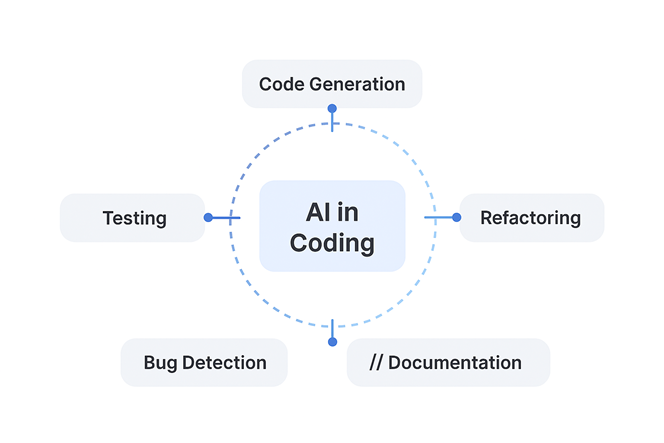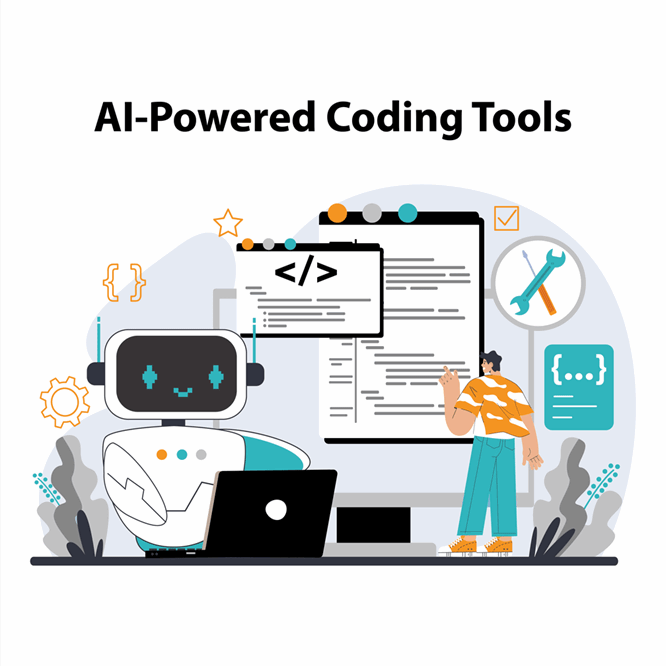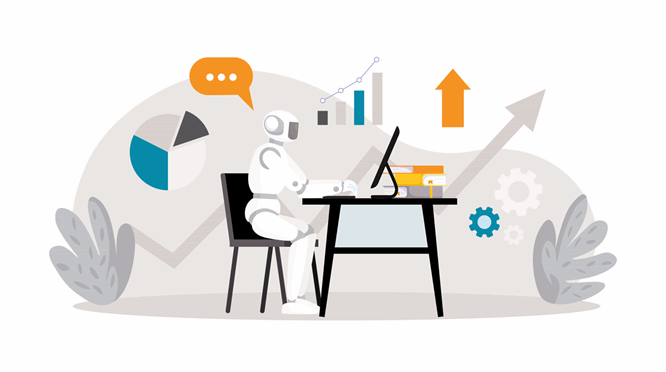For more information on your charming neighborhood CSW Solutions, visit us at our home or subscribe to our newsletter! We also do that social networking thing at: Twitter, Facebook, Linkedin, and Instagram! Check out our #funfactfridays
From Code to Co-Creation: How AI Is Reshaping the Developer’s Role
Software development used to feel like a solo mission—just you, your keyboard, and a bottomless pot of coffee. But that picture is changing fast. With the rise of generative AI, developers aren’t working alone anymore—they’re teaming up with intelligent systems that can write, review, and even reason about code. Tools such as machine learning algorithms, natural language processing, and automated testing frameworks are driving this change in the developer landscape. These tools allow developers to work more efficiently, identify patterns in data, and improve the quality of their code. By integrating AI into their workflow, developers can focus on higher-level tasks that require creativity and problem-solving skills.
In this new era of human-AI collaboration, certain skills will become increasingly important for developers. Skills such as a strong understanding of AI technology, the ability to work with data, and adaptability to new tools and technologies will be critical. Developers will need to embrace AI as a tool to enhance their work rather than view it as a threat to their jobs.
The Rise of AI Pair Programming
AI pair programming is revolutionizing the way developers work by providing an intelligent coding partner that never sleeps and is always ready to offer suggestions. Tools like GitHub Copilot, Amazon CodeWhisperer, and Replit Ghostwriter are now seamlessly integrated into IDEs, making it easier for developers to write code more efficiently. With AI pair programming, developers can benefit from faster coding, improved productivity, and access to a wealth of knowledge and resources at their fingertips. This innovative technology is changing the way developers collaborate and code, making the development process smoother and more effective. As AI continues to advance, the possibilities for AI pair programming are endless, and developers can expect even more exciting developments in the future.
Here’s what it looks like in action:
➤ Autocomplete on steroids: AI won't just finish your line, it can predict full functions based on your comments and/or patterns. It can generate accurate predictions that align with your style and preferences, showcasing the power of AI in streamlining workflows and making tasks more efficient.
➤ Context-aware suggestions: It actually understands your project structure and can provide suggestions that are tailored to the specific requirements of the project, making it easier to write clean and error-free code. This not only speeds up the development process but it would help to maintain consistency and best practices across the codebase.
➤ Plain-English prompts: Describe what you want like, "I want a program that takes a list of numbers and returns the sum of all the numbers." The AI will then take your plain-English description and generate the code needed to achieve that task. This can be a great tool for those who are not familiar with coding but have specific tasks they want to automate or solve using programming.
Developers aren’t just typing anymore, they are now orchestrating complex systems and solutions. AI handles the repetition so devs can focus on higher-level logic and design.

Beyond Code Completion: AI’s Expanding Role
Autocomplete is just the surface. AI tools can assist in code generation, testing, and debugging. Modern AI tools can now:
-
Refactor messy code into cleaner, more efficient versions, saving developers time and effort in rewriting code manually. Overall, improving the quality of the codebase from the start.
-
Generate documentation automatically (yes, even those dreaded README files) This helps maintain consistency and clarity in project documentation.
-
Write unit tests for your functions. Unit testing is a critical aspect of software development, as it helps identify bugs and makes sure that code functions as intended. By automating the process of writing unit tests, AI tools can help developers catch errors early in the development cycle.
-
Spot vulnerabilities before deployment, enhancing security measures and reducing the risk of potential breaches.
These are just a fraction of the time-consuming, tedious parts of development. Now, AI is taking care of them with speed and consistency, no need for sleep or Red Bull, and freeing us humans to think bigger and broader.
The Human Touch Still Matters in AI
Even as AI gets smarter, it’s not replacing developers, it’s augmenting them. The real magic still happens in human judgment, creativity, and empathy. Developers are able to bring a level of intuition and understanding that AI lacks, making them indispensable in the software development process.
That means developers are still essential for:
-
Designing experiences that feel right for real users - Developers play a crucial role in creating user-friendly interfaces and seamless interactions that cater to the ever-changing needs and preferences of real people and cultures. By understanding user behavior and feedback, devs can ensure that the end product is intuitive and enjoyable to use.
-
Making ethical calls around privacy, fairness, and bias - As technology becomes increasingly integrated into our daily lives, it is essential that developers are there to prioritize ethical considerations when designing and implementing software. They must ensure user data is protected, algorithms are fair and unbiased, and decisions are made with the best interests of society in mind.
-
Solving open-ended problems that don’t have one “correct” answer - They need to also be the ones to think creatively, direct AI toward the right goals, and analytically to come up with innovative solutions to complex challenges, pushing the boundaries of what technology can achieve.
Developers are able to think outside the box, come up with innovative solutions, and adapt to changing requirements in a way that AI cannot. The human element will always possess the empathy needed to understand user needs and create solutions that truly benefit people.AI can suggest possibilities. But only humans can decide which ones are worth pursuing.
Who Owns AI-Generated Code?
Now for the big legal question: if AI writes part of your codebase, who owns it? The issue of who owns the code, whether it's you, your employer, or the AI company, is a complex legal question that is forcing the industry to rethink licensing, intellectual property, and accountability. And there’s more:
💡How do you safely use AI-generated snippets in open-source projects?
💡If an AI introduces a bug or bias, who’s responsible?
If you are using AI to write part of your codebase, it's important to establish clear agreements and contracts regarding ownership of the code. Some companies may argue that if you are using their AI technology to write the code, then they own the intellectual property rights to it. On the other hand, you may argue that since you are the one implementing and using the AI, you should have ownership of the code. Companies have already begun to implement clear policies and agreements regarding ownership of code created by AI to avoid potential legal disputes in the future. As of now, there are no clear-cut answers to these questions, as the laws surrounding AI-generated content are still evolving. Developers need to keep up with these evolving rules, because this is one part of coding AI can’t navigate for you.
Real-World AI in Action
Shopify uses AI to help developers generate storefront templates from simple descriptions. This innovative tool allows developers to quickly and easily create custom storefronts without the need for advanced coding skills. By simply describing the desired layout, color scheme, and features, developers can generate a unique and visually appealing template in a matter of minutes.
Stripe relies on AI to spot fraud and fine-tune payment systems. This proactive approach helps protect both merchants and customers from potential financial losses. By analyzing customer behavior and transaction patterns, AI algorithms can help optimize the payment process to reduce friction and improve overall user experience. This results in faster and more secure transactions, ultimately benefiting both businesses and consumers.
Indie devs are using AI to ship minimum viable products (MVPs) out to market faster than ever, building apps and mock-ups by themselves, in record time. With the help of AI, developers can quickly iterate on their ideas, test out new features, and gather feedback from users. This trend is likely to continue as AI technology continues to advance and become more integrated into the development process.
Across the board, AI is speeding up development and leveling the playing field.

The New Developer AI Skillset
To thrive in this new era, developers need to add some new tools to their toolkit:
✦ Prompt Engineering: Learn how to “talk” to AI clearly so you get the right output. By refining their ability to provide clear instructions and prompts, developers can improve the performance and outcomes of AI technology.
✦ Systems Thinking: This involves taking a step back and focusing on the bigger picture, including architecture and strategy, while allowing AI systems to handle more routine or repetitive tasks. By adopting this approach, developers can create more robust and scalable solutions that can adapt to the rapidly changing technological landscape.
✦ Testing & Validation: AI makes mistakes too. It is important to know how to thoroughly test AI algorithms and models in order to catch and fix any errors quickly, minimizing the impact on your operations.
✦ Collaboration: AI adds another “teammate” to the mix, so communication with people (and systems) is key. AI is not meant to replace humans, but rather to complement and enhance our abilities. This means that communication between people and AI systems and working together as a team is the best way to go. Humans provide the context and understanding that AI often lacks, while AI can process vast amounts of data and perform complex calculations at speeds that humans cannot match.
Challenges and Limitations
Let’s be real—AI isn’t perfect. Developers need to stay sharp to avoid pitfalls like:
-
Hallucinations: Code that looks right but doesn’t actually work. This can lead to errors and inefficiencies in the system.
-
Security risks: AI can suggest unsafe or non-compliant solutions, putting sensitive data at risk. It's important for developers to prioritize security measures and regularly update and monitor their AI systems to prevent breaches.
-
Over-reliance: Letting your own coding instincts atrophy. While AI can enhance productivity and efficiency, it's important for developers to continue honing their skills and knowledge to ensure they are not solely dependent on AI for problem-solving.
The secret? Use AI as an accelerator, not a replacement.
From Builder to AI Curator
The role of developers has evolved over time from building everything line by line to acting more like curators for AI. Instead of writing out every single line of code, developers now guide AI, review its output, and make high-level design choices. This shift has allowed developers to focus more on creativity, strategy, and impact rather than getting bogged down in the nitty-gritty of syntax.
This new way of working is freeing in a sense, as it allows developers to explore their creative side and make strategic decisions that can have a significant impact on the final outcome. It also highlights the importance of adaptability and willingness to embrace new technologies. However, this freedom also comes with new responsibilities. It's important to understand the ethical implications of using AI in writing, ensuring that the content created is ethical and aligns with fluctuating societal values. Designing effective prompts that guide AI in the right direction is another important aspect of working with this technology. It is more important than ever to be committed to constantly learning and evolving as AI technology continues to advance.

What AI Means for Teams and Companies
For businesses, AI-assisted development means:
✔️ Faster time to market
✔️ Lower costs
✔️ More innovation
But it also means teams need to adapt:
-
Hire for AI fluency, not just coding chops. This way, companies will have teams that are equipped to effectively use AI technologies
-
Integrate AI into continuous integration/continuous deployment (CI/CD) and review pipelines. Streamline development workflows so that AI is seamlessly integrated into existing systems.
-
Keep training developers on the ethical and technical side of AI. This can help teams navigate the complexities of AI implementation responsibly.
The organizations that get this balance right will move faster and smarter. Moreover, AI-assisted development can also result in more innovation. AI technology has the ability to analyze vast amounts of data and generate insights that humans may not be able to see. This can lead to new ideas and operational approaches within the business. By using AI in the development process, businesses can stay ahead of the curve, save on costs, and continue to push boundaries in their respective industries.
Welcome to the Co-Creation Era
We’re living in a new era of software development—one built on co-creation. Developers aren’t just writing code anymore; they’re teaming up with intelligent systems to build smarter, faster, and more innovative software than ever before.
AI isn’t replacing developers—it’s working with them. It’s helping spot patterns, automate the boring stuff, and free up time for what really matters: solving problems and creating something new.
This shift marks more than just a change in tools—it’s a change in identity. Developers are no longer just programmers; they’re creators, collaborating with AI to push the limits of what’s possible.
Because the future of development isn’t solo anymore. It’s symphonic. 🎶
How CSW Solutions Can Help You Embrace AI-Augmented Development
As AI transforms the software development landscape, having the right partner makes all the difference. CSW Solutions, a Chicago-based, Microsoft Partner firm, specializes in custom AI and software development, cloud migration, and managed IT services that are built for the future.
Whether you're looking to integrate AI into your workflows, modernize legacy systems, or build scalable web and mobile applications, CSW Solutions brings over 20 years of experience and a deep commitment to understanding your unique business needs. Our team excels in:
- ⚙️ Custom .NET and enterprise software development
- ☁️ Azure cloud consulting and migration
- 📱 Mobile and web application design
- 🔐 Secure, scalable infrastructure and data solutions
- 🧠 AI-ready architecture and integration strategies
- 🤝 AI Agents and implementation strategies
We don’t just build software, we build relationships, ensuring every solution is tailored, ethical, and future-proof.
Ready to transform your development process?
👉 Contact CSW Solutions today to start your journey.
